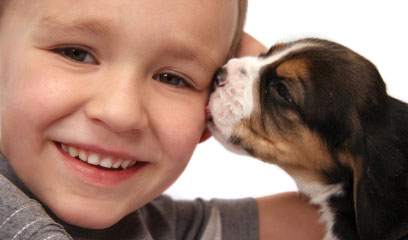 Whether you have no pets or many, it is nearly inevitable that your preschooler will ask for one, or another one. If he has a cat, he wants a dog; and if he has both, he wants a hamster or a pony.
Whether you have no pets or many, it is nearly inevitable that your preschooler will ask for one, or another one. If he has a cat, he wants a dog; and if he has both, he wants a hamster or a pony.
If your family is ready for a new pet, it can be a great experience for your little one, and there are many options for preschoolers.
"It's a good way for them to learn responsibility and caring for other things," says Mari Smultea of Issaquah, a marine biologist and mother of two daughters, ages 7 and 10. Her family has two guinea pigs, three horses, a pony, a cat, three dogs and fish. Some of those pets joined the family during the girls' preschool years.
Smultea's daughters began feeding their dogs at age 4. "I had to supervise to make sure it happened, but they got the food and gave it to the dogs," she says. The girls are also responsible for feeding the guinea pigs and helping clean the cage each week. Having pets has also taught the girls about life and death. "Guinea pigs don't live long," Smultea adds. "We've had many pet funerals."
Safety is usually a primary concern when choosing a preschooler's pet. Mark Eckert of Everett was seeking a dog for his daughters, ages 3 and 5, so he researched breeds known for calmness and tolerance of young children. His goal was a dog "that can handle kids pulling at it and that has the temperament not to nip or bite."
Also consider the pet's safety, says Dr. Paul Linvog, a veterinarian at Frontier Village Veterinary Clinic in Lake Stevens. "Gentleness is a learned behavior... I've had puppies come in with broken legs from being dropped." (Linvog advises parents to have small children sit down while holding a pet.)
Experts advise choosing a pet that is patient and can tolerate a preschooler's exuberance. You also need to teach your child how to ensure his or her own safety by treating pets appropriately (for example, no petting while the animal is eating). And be prepared to supervise your child and the pet. The Humane Society for Seattle/King County recommends parents not leave children 5 and younger unsupervised with pets.
Linvog adds that young children with pets may forget to be careful with strange animals. "You will have to remind them to ask the owners before they touch other pets," he says.
As for animals that make good pets for preschoolers, Linvog's favorite recommendation is a kitten. "Goldfish and hermit crabs are nice," he adds. "They're easy and safe, but they don't provide a lot of interaction." Kittens and puppies are more interactive, but a kitten that doesn't want to be handled can get away relatively easily, he says.
"I would definitely choose a puppy or kitten over an adult animal. If they are raised with kids, they are usually very good around kids," Linvog says. "You don't want to bring a stray adult into the house and find out the hard way that they aren't used to kids."
Smultea likes guinea pigs for children ages 3 to 5. "Guinea pigs respond to kids. A mouse or hamster won't," she says. "They like to be held, and they tend not to nip."
When selecting a pet, it's also important that the animal blends easily into your family's lifestyle.
"We needed a dog that fit our energy level," says Eckert, who got a small poodle mix for his busy family. "We can go on walks, but we needed a dog that wouldn't need long walks." The Eckerts were also happy to get a puppy that was mostly "potty trained."
Between chewed toys and puppy training, Smultea says she found it a little challenging to have a puppy and preschoolers at the same time. In hindsight, she says, she might have waited until her kids were older to get a puppy, and instead acquired less time-intensive pets or found an adult dog that had a good track record with kids.
Julie Kumasaka is a technical editor and occasional freelance writer. She lives in Everett with her husband, 5-year-old daughter and two cats.
Tips for choosing the right pet for your preschooler
The Humane Society for Seattle/King County recommends you consider the following when deciding whether your family is ready for a pet, and what type and breed is best.
Consider your lifestyle:
- How much time do you have provide care and attention?
- How active a pet can your family's temperament and lifestyle bear?
- How much space do you have? Do you have a home or an apartment? Yard or no yard?
- How much are you willing to spend on the original cost and set-up? How much on ongoing care?
Find out the following about your potential pet:
- Temperament and typical behavior
- Size
- Special grooming needs
- Diet and health-care concerns
- Exercise and space requirements
- Required level of attention
- Ease of training
For details, additional considerations and pet-search resources, check out the following Humane Society article.









